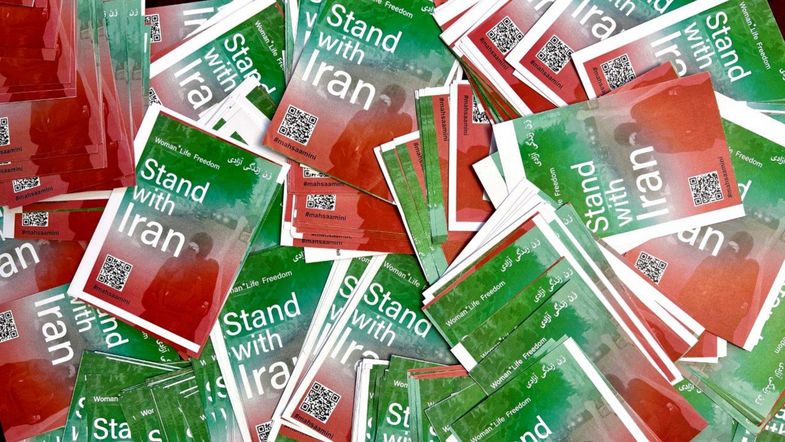Clear commitment to human rights and academic freedom
At the meeting, which was attended by another Iranian doctoral student as well as representatives of the Student Council and the Studentenwerk Leipzig, Vice-Rector Middell once again emphasised the University’s clear commitment to human rights and academic freedom. “By presenting nearly 400 signed postcards, we want to show how many students, staff and others connected to the University feel the need to support the issues raised at the protest,” Naiera Amini said.
Widespread protests in Iran, major difficulties for Iranian students abroad
The discussion focused on the breadth of the protests in Iran and the severity of the persecution by the government and militias, as well as the concrete consequences of this escalation of the crisis for students from Iran in Leipzig. “Iranian students abroad are currently experiencing great financial and emotional hardships. Due to sanctions and restrictions on making international bank transfers from Iran, many of them have to return home to get the money they need for their studies,” Amini explained. She pointed out that those who support the protests currently taking place in Iran, however, are at great risk of arrest if they return. “So there is a need for loan schemes, temporary research and teaching positions at institutions, but also counselling and referral services.”
Support options to be expanded
Katharina Tiemann, who attended on behalf of the Student Council, added: “Since even peaceful protests at Iranian universities have been brutally suppressed, the Student Council feels that Leipzig University has a duty to use its reputation and take a clear stand. We believe this includes supporting local Iranian students and staff.” Vice-Rector Middell assured that the University would provide all the assistance it could. “Unfortunately, we cannot respond spontaneously to financial emergencies, but are dependent on programmes of support from the German Academic Exchange Service for students and academics from Iran,” he said. In addition to the existing counselling services at Leipzig University, the Studentenwerk Leipzig intends to work closely with those affected to create further tailored services in the short term.
There are currently 92 students and doctoral researchers from Iran enrolled at Leipzig University. The International Centre at Leipzig University and the Studentenwerk Leipzig will align their support services even more systematically with the needs of this group. In addition, Leipzig University is planning further information sessions to shed light on the background of the current situation in Iran. Vice-Rector Middell also suggested a crowdfunding initiative: by involving the association “Hilfe für ausländische Studierende in Leipzig e. V.”, financial support could be mobilised at short notice and at least on a selective basis.
University calls for crisis resilience fund
Last but not least, the Vice-Rector for Campus Development: Cooperation and Internationalisation emphasised that he also viewed the protesters’ signatures as support for the course taken by Leipzig University, which is calling on politicians to introduce appropriate programmes that enable it to react quickly and directly to emergencies caused by current global political crises and their consequences for students and staff: “In addition to the many good, state-specific programmes, we need freely available financial resources in order to be able to use a fund for crisis resilience at the very moment when crises worsen.” He pointed out that people expect the University to help quickly when students cannot return to their home countries because of the suppression of democratic movements and are traumatised by the worries for their relatives.






























































